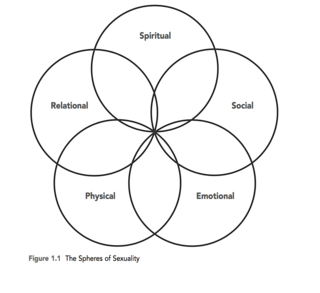Sex
What Parents Need to Address About Sex
The Five Spheres of Sexual Awareness
Posted October 1, 2017

Talking about sex is something that parents need to address openly and clearly. We know that babies are sexual—in the sense that they touch themselves sexually, in the womb; so, it’s never too early to talk about what naturally is part of your children’s life. Their understanding of sexuality is central for your children to develop confidence. In our information age, numerous materials are readily available to help you address particular questions tailored in an age-appropriate manner.
Sex is More than Body Parts
The World Health Organization defines sexual health as involving the integration of “physical, emotional, mental, and social well-being.” Unlike what is covered in a sexual health class, sexuality is not only about anatomy, the avoidance of sexually transmitted illness, and sexual differences, but, most significantly, about personal fulfillment. Sex requires awareness of a positive and respectful approach of understanding and integration with our whole self in relationship.
It’s particularly important for us, as parents, to speak with our children about sexuality, because sexuality involves a wide range of life issues that involve sexuality. So, sex does not only involve a sexual act by itself. Sex involves far more than body parts and raging hormones—it expresses our personality and moral choices and our capacity to love and share intimacy.

The Five Spheres of Sexuality
Sexuality is an outgrowth of our whole being and encompasses several spheres of our life. Thus, sex and sexuality need to be recognized as “‘holistic,” or a whole life, activity. You may find it useful to consider each of the following spheres as you discuss your children’s questions about sex. Your children may ask you specific questions, and your role is to help them integrate their concerns into a healthy understanding of their life, over time, as they grow in understanding of themselves. Let’s identify these five aspects of our sexuality:
Physical. Our physical sex drives, needs, and actions—the biological part of the sexuality that we see, feel, and touch.
Emotional. Our inner feelings and that manifest in our expression of sexuality, including intimacy, and love. For example, our emotional feelings such as tenderness, vulnerability, excitement, and love, as well as hurt, shame, and fear take on our sexual expression.
Relational. Our relationships and understanding how the person toward whom we have sexual feelings. Relationships, including those that are sexual, involve negotiating communication, control, power, and dependency.
Social. Our culture’s influence on our attitudes and behaviors. For example, society imparts definitions of masculinity, femininity, and gender roles, and we learn about sexuality from the models of our family, various institutions, media, and our social interactions.
Spiritual. Our values, faith, and spirituality influence our attitudes and approach to our sexuality, sometimes both positively and negatively. For example, our views of spirituality and religion may direct us to values that nurture a healthy expressions about sex and love and may instill various and even mixed attitudes, from feeling our conscience to feelings of guilt or from inspiring principles about fulfilling love to feelings of denying our sexuality.
Talking about sex requires sensitivity to all these spheres as sex they all affect our whole being. So talking about sex and sexuality shouldn’t begin and stop at discussing body changes and reproduction alone; we need to take into account the full range of these spheres that affect our attitudes, feelings, and behaviors.

What Makes Us Different in the Animal Kingdom?
Human beings demonstrate a unique capacity to integrate these five aspects or spheres in sexual behavior. Yet, we sometimes let one or more of the spheres of sexuality to take control or possibly fall by the wayside. You can help your kids move toward overall sexual health by considering their questions and your advice in age appropriate ways in view of these various spheres. The point is not to let their questions get disconnected from the larger big picture, recognizing that sex is uniquely expressed for each person.
It can be helpful to imagine the aspects of sexuality as interacting spheres in our life (See the Figure of the Five Spheres, below). Each of us integrates the physical, emotional, relational, social, and spiritual spheres in our own way. They spheres may be overlapping or disconnected, in some instances; and some spheres may be larger than others or totally absent.
The interplay among these five spheres results from how we understand and express our sexuality--which is why it is important for parents to weigh in. For example, if our spiritual sphere is small or neglected, spiritual concerns may not get considered in our sexual thoughts, feelings, and behaviors. Or if the social sphere is largest, social expectations and attitudes may govern our sexuality. Understanding these sphere provides insight into how your children express their sexuality:

Purposes of Sex
As discussions open to understand sexuality, the purposes for sex will probably not be far behind. You may want to think about how you understand the objectives of sex before discussing sex with your children. Sex serves several purposes for people: procreation (of course), pleasure, stress relief, formation of our identity, intimate connection, as well as their most meaningful expression of love. Are you prepared to consider these various purposes of sexuality, in age appropriate ways, as you talk about sexuality with your children?
Helping your kids understand sexuality will be much more manageable as you clarify your own understanding and reflect on your own development about sexuality—and how these five spheres converge.

Consider how your sexual experiences have been influenced by various physical, emotional, relational, social, and spiritual factors. For example, if you find that cultural norms greatly influenced your sexuality, you might recognize that social standards significantly guided your actions through your peer attitudes. Or if you found that spirituality significantly influences your sexual behavior, you may recognize that your sexuality has been particularly guided by spiritual values. Consider how each of these spheres have influenced and continue to influence your life. Your self-awareness and clarity about these areas will enable you to speak from an authentic and understanding position about sexuality with your children and serve to help you guide them in developing their path of their sexual self.
John T. Chirban, Ph.D., Th.D., is a lecturer at Harvard Medical School, part-time, and author of How to Talk With Your Kids About Sex, and recently published Collateral Damage: Guiding and Protecting Your Child Through the Minefield of Divorce (HarperCollins, 2017). For more information visit drchirban.com.




